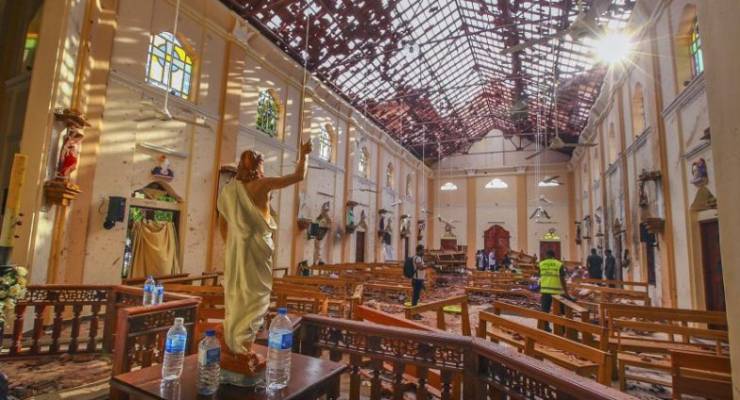
Last weekend’s deadly Sri Lankan bombings have underscored rising religious intolerance and the fragility of inter-religious peace in South Asia and, increasingly, significant parts of Southeast Asia.
This peace has been almost completely unstitched in Pakistan, if indeed it really every existed there. Attacks on the small Christian minority — that nonetheless counts about 2.5 million adherents, half Catholic and half Protestant — are a depressingly regular occurrence. The past few Easters have seen violence rip through Christian communities in the world’s second largest Muslim nation after Indonesia. In 2016, 75 people were killed in a heavily Catholic Lahore neighbourhood as hundreds of families celebrated in a park after Easter Mass. In 2018, also during Easter, four Protestants were shot dead by Islamic radicals in the city of Quetta. There have been numerous other deadly attacks outside Holy Week in recent years.
There have been attacks on Christians in other majority Muslim countries too. In Bangladesh, the fourth largest Muslim country in the world, the previously more secular regime of Sheik Hasina’s Awami League has recently joined with more conservative groups that publicly rail against the very small Christian minority.
In Indonesia, Christians make up about 10% of Indonesia’s 240 million people and conservative Islam is starting to grow — a trend underscored by recently re-elected President Joko Widodo choosing conservative cleric Ma’ruf Amin as his running mate. In May last year, attacks by suicide bombers on the central island of Java ripped through three churches in the second largest city of Surabaya. Thirteen people were killed and dozens were injured.
Even the Philippines, the only majority Christian country in South- or Southeast Asia apart from tiny Timor-Leste, has not been spared. In January this year two bombs exploded in a Catholic cathedral in Jolo on the southern island of Mindanao, which is home to most of the country’s Muslims just north of Indonesia. The attack killed 20 people and injured others; responsibility was claimed by the so-called Islamic State.
In multiple Muslim nations (including Pakistan, Bangladesh and Indonesia) harsh blasphemy laws have come along with more conservative Islam. In Pakistan, Christian woman Asia Bibi was sentenced to death on a blasphemy charge that was eventually overturned in what appears to be a close decision by the country’s highest court. And in Indonesia the governor of Jakarta, Basuki “Ahok” Tjahaja Purnama, was thrown out of office by voters in 2016 after a politically motivated blasphemy charge that later saw him sentenced to two years in prison.
But perhaps most strikingly, Christians — along with Hindu’s traditional “enemy”, Muslims — have also been targeted under the increasingly Hindu-nationalist rule of Indian Prime Minister Narendra Modi. Hindus have tended to target India’s 25 million or so Christians — most of whom are Catholics and many of whom are ethnic minorities or so-called “tribals” that live in mountainous areas of the country’s centre and north east. But it’s Muslims (numbering close to 200 million) who have been most violently targeted by Hindu nationalists.
There have been multiple cases of Muslim lynchings by Hindu mobs, and the ruling Bharatiya Janata Party is calling for an unprecedented National Register of Citizens to enable the identification of Muslims, Christians, Sikhs and other persecuted minorities. Such a program is already underway in the north-eastern state of Assam where about 25% of the population are Muslims — many are the economic refuges from neighbouring Bangladesh. If instated nationwide, the program could tear up the sectarian contract that has underpinned modern India.
Lest the Buddhists get let off the hook: it’s worth noting that much of Sri Lanka’s sectarian violence has been perpetrated against Hindu Tamils (a small percentage of the ethnic group are Christian or Muslim) during the 25-year civil war that ended in 2009. It is hardline Buddhists that helped drive the well-documented sectarian violence against the ethnic Muslim Rohingya in western Rakhine province. Effective state-sponsored Buddhist nationalism played a key role in driving out more than 750,000 Rohingya into neighbouring Bangladesh. It’s a situation that remains very much unresolved.
This all adds up to an increasingly toxic recipe on Australia’s doorstep, and it’s only getting worse.








I think the two royal commissions into institutional child abuse demonstrated that religious attacks on Christian and other children was already well established in Australia.
If I don’t renew my Crikey subscription this year it will be partly because of the continued use of Sainsbury as a commentator on all things Asian. Just to stick to the part of the article where I’m relatively well informed, Ahok was a very capable and, as far as anyone knows, honest administrator when he was deputy governor of Jakarta under Jokowi. They made a good double act. As governor his brusque manner, which many in Indonesia would have seen as rudeness, rubbed a lot of people up the wrong way. His toughness in dealing with slum clearance, moving people away from their homes and businesses made further enemies. Then the way he dealt with some opponents who said Muslims shouldn’t vote for an unbeliever was clumsy at best. He has friends among the Muslim scholars and all he needed to do was ask one of them to say publicly that not supporting a non Muslim referred to times of conflict, not applicable in a peaceful country. They would have said that and he could have used their authority. Instead he spoke out himself without authority about a religion he doesn’t follow and offended many. Despite that, Mr Sainsbury, 2.3 million Jakartans, most of them Muslim, voted for him.